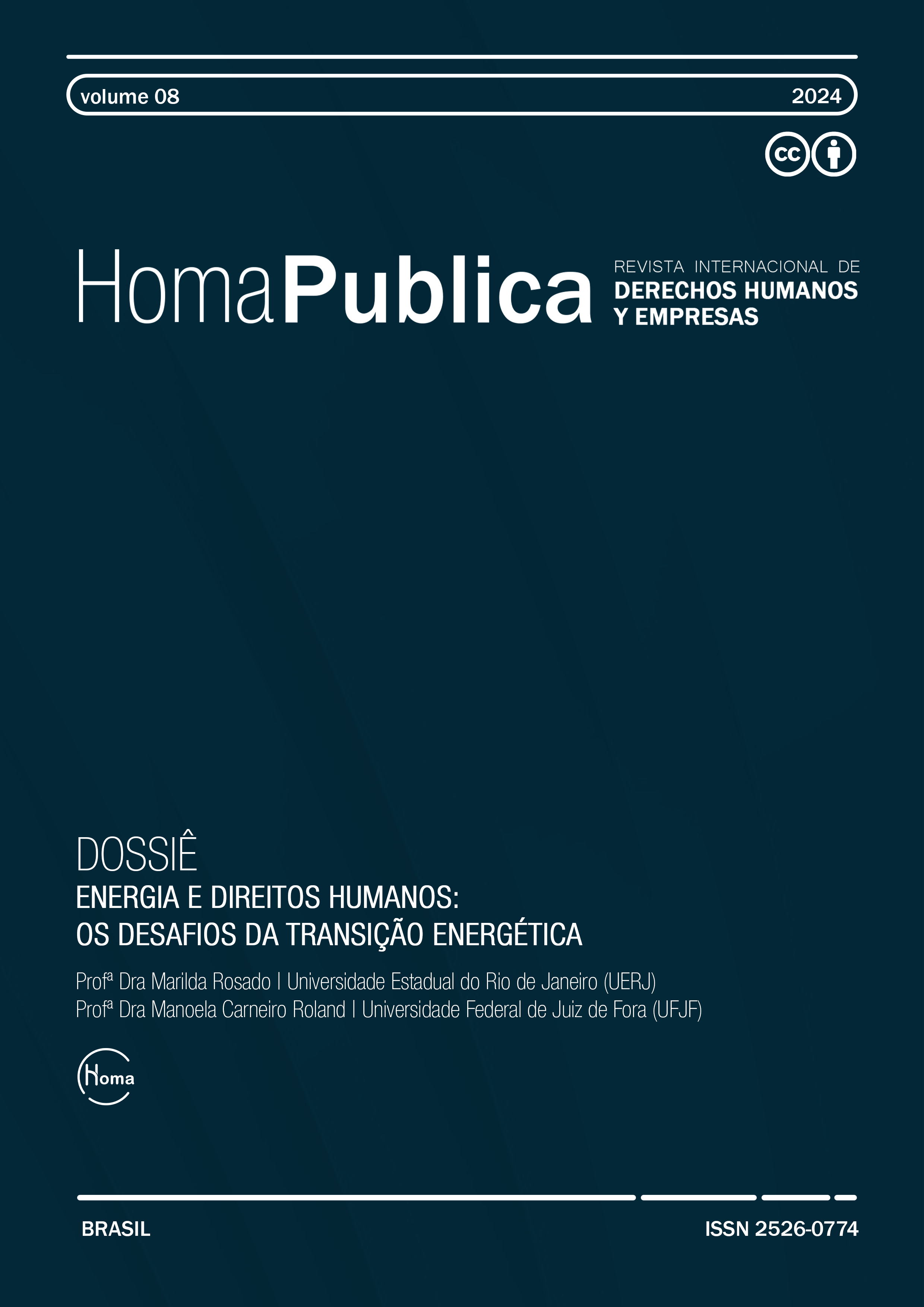LIBERALIZED ENERGY MARKET AS A POLITICAL TOOL IN THE BRAZILIAN ENERGY TRANSITION
Published 2024-09-17
Keywords
- Energy matrix,
- Liberalized energy market,
- Climate policy
How to Cite
Copyright (c) 2024 Homa Publica - Revista Internacional de Derechos Humanos y Empresas

This work is licensed under a Creative Commons Attribution 4.0 International License.
Abstract
Despite its natural vocation for renewable energies, Brazil has suffered disproportionately from climate crises and changes in hydrological cycles, with variations of up to ⅓ in the electricity sector's carbon footprint due to droughts, reductions in hydroelectric production and migration to carbonized options. At the same time, the liberalization energy trade has been taking place in the country and, like the other liberal energy trades around the world, it has been established without any associated climate policy, although advances in low climate impact options have been observed, unintentionally. Organizations committed to reducing their emission indicators have been taking the lead in buying energy with a low emission factor on the liberalized market, encouraging the market, and the traders themselves are catalyzing these options too. Thus, this article proposes an analysis of the potential of the Brazilian liberalized energy trade that is still in progress, in the face of decarbonization of the energy matrix, through bibliographical research, technical reports and historical and current documentary research on the subject.
Downloads
References
- ABRACEEL (2023). Aos 25 anos, comercializador de energia cresce e diversifica atividade. Artigos. [Online] 20 de outubro de 2023. Acesso em: 29 de abril de 2024: https://abraceel.com.br/biblioteca/artigos/2023/10/aos-25-anos-comercializador-de-energia-cresce-e-diversifica-atividade/.
- ABRACEEL (2024). RELATÓRIO ANUAL ABRACEEL 2023. Brasília.
- Agência Nacional de Energia Elétrica (2021). BANDEIRAS TARIFÁRIAS. FAQ: Tire suas dúvidas sobre a Bandeira Escassez Hídrica. 2022. [Online] Agência Nacional de Energia Elétrica, 31 de setembro de 2021. Acesso em: 05 de maio de 2024: https://www.gov.br/aneel/pt-br/assuntos/noticias/2022/faq-tire-suas-duvidas-sobre-a-bandeira-escassez-hidrica.
- Caixeta, GV (2023). Mercado Livre de Energia: um estudo sobre o setor e análise das recentes mudanças regulatórias. [Dissertação de mestrado, Universidade Federal de Uberlândia]
- CÂMARA DE COMERCIALIZAÇÃO DE ENERGIA ELÉTRICA (2024). CCEE. Volume de migrações para o mercado livre bate novo recorde no primeiro trimestre. [Online] CCEE, 19 de abril de 2024. Acesso em: 10 de maio de 2024: https://www.ccee.org.br/pt/web/guest/-/volume-de-migracoes-para-o-mercado-livre-de-energia-bate-novo-recorde-no-primeiro-trimestre-de-2024.
- EMPRESA DE PESQUISA ENERGÉTICA (2023). Anuário Estatístico de Energia Elétrica 2023 - Ano base 2022. Rio de Janeiro.
- EMPRESA DE PESQUISA ENERGÉTICA (2023). Balanço Energético Nacional 2023: Ano base 2022. Rio de Janeiro.
- FUNDAÇÃO GETÚLIO VARGAS (2023). NOTA TÉCNICA Diretrizes para a contabilização de emissões de Escopo 2 em inventários organizacionais de gases de efeito estufa no âmbito do Programa Brasileiro GHG Protocol. Versão 4.0. São Paulo. Escola de Administração de Empresas de São Paulo (FGV EAESP). Centro de Estudos em Sustentabilidade (FGVces), 2023.
- FUNDAÇÃO GETÚLIO VARGAS (2023). RELATÓRIO ANUAL DO PROGRAMA BRASILEIRO GHG PROTOCOL RESULTADOS DO CICLO 2023. São Paulo. Escola de Administração de Empresas de São Paulo (FGV EAESP). Centro de Estudos em Sustentabilidade (FGVces).
- GOVERNO DO ESTADO DO RIO GRANDE DO SUL (2024). Novo decreto amplia número de municípios atingidos pelas cheias dos rios. Ascom Casa Civil. [Online] 05 de maio de 2024. Acesso em: 10 de maio de 2024: https://www.estado.rs.gov.br/novo-decreto-amplia-numero-de-municipios-atingidos-pelas-cheias-dos-rios.
- IEA (2005). Lessons from Liberalised Electricity Markets. Paris, 2005. Acesso em: 15 de maio de 2024: https://www.iea.org/reports/lessons-from-liberalised-electricity-markets
- IEA (2022). Steering Electricity Markets towards a Rapid Decarbonisation. Acesso em: 20 de abril de 2024: https://www.iea.org/reports/steering-electricity-markets-towards-a-rapid-decarbonisation
- IEA (2022). World Energy Outlook 2021. Paris. Acesso em: 20 de abril de 2024: https://www.iea.org/reports/world-energy-outlook-2021
- IEA (2023). Climate Change - Topics, the energy sector is central to efforts to combat global warming. [Online] setembro de 2023. Acesso em: 01 de maio de 2024: https://www.iea.org/topics/climate-change.
- IPCC (2022). Climate Change 2022: Impacts, Adaptation and Vulnerability. Contribution of Working Group II to the Sixth Assessment Report of the Intergovernmental Panel on Climate Change. Cambridge, UK e New York, NY, EUA. Cambridge University Press. p. 3056.
- IRENA. (2022). World Energy Transitions Outlook 2022: 1.5°C Pathway. Abu Dhabi: International Renewable Energy Agency.
- Levitt, CJ, Saaby, M e Sorensen, A (2019). The impact of China's trade liberalisation on the greenhouse gas emissions of WTO countries. China Economic Review. 2019, Vol. 54. HYPERLINK "https://doi.org/10.1016/j.chieco.2018.10.012" h https://doi.org/10.1016/j.chieco.2018.10.012
- Marhold, A (2017). The Interplay between Liberalisation and Decarbonisation in the European Internal Energy Market. Energy Law & Economics. Springer Publishers, Forthcoming, 2017. HYPERLINK "https://dx.doi.org/10.2139/ssrn.3015809" h http://dx.doi.org/10.2139/ssrn.3015809
- Murshed, M (2020). Are Trade Liberalization policies aligned with Renewable Energy Transition in low and middle income countries? An Instrumental Variable approach. Renewable Energy. Vol. 151, pp. 1110-1123. https://doi.org/10.1016/j.renene.2019.11.106
- Nicolli, F e Vona, F (2019). Energy market liberalization and renewable energy policies in OECD countries. Energy Policy. Vol. 128. https://doi.org/10.1016/j.enpol.2019.01.018
- Ponce, P, et al. (2020). The Liberalization of the Internal Energy Market in the European Union: Evidence of Its Influence on Reducing Environmental Pollution. Energies. https://doi.org/10.3390/en13226116
- Zeeshan, M, et al. (2022). Comparative Analysis of Trade Liberalization, CO2 Emissions, Energy Consumption and Economic Growth in Southeast Asian and Latin American Regions: A Structural Equation Modeling Approach. Frontiers in Environmental Science. Vol. 10.https://doi.org/10.3389/fenvs.2022.854590

